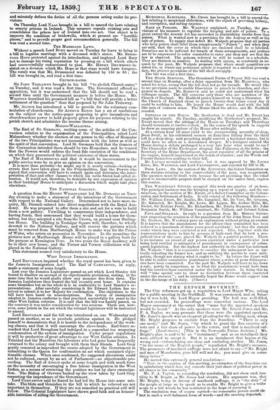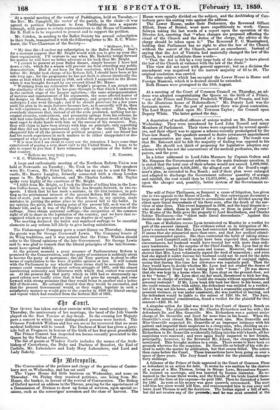THE REFORM MOVEMENT.
The City reformers got up a requisition to Lord Mayor Wire, asking for a public meeting in the Guildhall. It was summoned, and on Satur- day it was held, the Lord Mayor presiding. The hall was well-filled, but not crowded. Its proceedings were somewhat curious, The Lord Mayor announced at the outset that "none but the appointed speakers would be heard." As the only speakers were Mr. Ernest Jones and Mr. P. A. Taylor, we may presume that these were the appointed speakers. Mr. Jones's speech was an eloquent pleading for the working men, whom Mr. Bright proposes to exclude from the franchise. "There is only one mode," said Mr. Jones, "by which to grant the free exercise of a vote and a fair share of power to the voters, and that is manhood suf- frage." (Loud cheers.) [This is the Newcastle Union doctrine.] , Mr. Bnght's plan is said to be an "instalment," and as an instalment they were advised to accept it. But it is an instalment that begins at the wrong end—enfranchising one class and excluding another. Mr. Jonas, "in the name of the English people," repudiated Mr. Bright's measure. The promoters of manhood suffrage were not afraid to say—" Mr. Bright and men of Manchester, your bill will not do; you must give us some- thing better."
He moved this extremely general resolution- " That, in the opinion of this meeting, no extension of the franchise can be satisfactory which does not concede their just share of political power, to all classes in the community"
Mr. P. A. Taylor, in seconding the resolution, ffid not show such hos- tility to M. Bright as Mr. Jones had shown. His argument was, that Mr. Bright, being in favour of manhood suffrage, it is "the duty" of the people at large so to speak as to enable Mr. Bright to give a wider scope to a bill which he has restricted in the hope of carrying it. The resolution was of course canied—no reasonable person could ob- ject to such a well-balanced form of words—and the meeting departed.
- At a special meeting of the vestry of Paddington, held on Tuesday,— 'the Rev. Mr. Campbell, the rector of the parish, in the chair—it was agreed to petition Parliament to form Paddington into a separate borough, with power to return representatives to the House of Commons. Sir B. Hall is to be requested to present and to support the petition. Mr. Cobden, in sending to the Ballot Society his annual subscription to their funds, transmitted it with the following letter to Mr. E. C. White- hurst, the Vice-Chairman of the Society- " Midburst. Feb. 7.
"My dear Sir—I enclose my subscription to the Ballot Society. Don't for a moment suppose that Mr. Bright would wish you to give up your dis- tinct organization. I'll venture to say when Mr. Berkeley brings. forward his motion he will have no better advocate at his back than Mr. Bright.
"I cannot be present at your Ballot dinner, simply because I have laid down a rule, which for a season will prevent me from attending any public demonstration. Had it not been for that resolution, which I had formed before Mr. Bright took charge of his Reform Bill. I should have been at his side long ago ; for the programme he has put forth is almost identically the same as that which I endorsed in 1848, and which I supported in the rouse when it was brought forward by our revered friend Mr. Hume. "Watching from my retirement Mr. Bright's progress, I am struck with the similarity of the ordeal he has gone through to that which I underwent in the earliest stage of the League agitation,—the same misrepresentation of motives and misstatement of his arguments, the same affected horror of his designs on Monarch, Church, aristocracy, and property which he now undergoes I also went through ; and if he should persevere for a few years until his plan in its main features becomes law, as it assuredly will do, then he will experience, as I did, the pleasanter side of the ordeal. Then, when everybody discovers that, instead of all the evils predicted, nothing but in- creased security, contentment, and prosperity springs from his reforms, he will find nine-tenths of those who now profess the greatest dread of him the most eager to shake hands with him on the success of his measures. Nay, they will claim to have been always with him on principle only regretting that they did not better understand each other at the outlet. This is the chequered fate of all the pioneers of political progress ; and our friend has bad too much experience in such matters to be either disappointed or dis- couraged at what is now happening. It is true that I am about to carry out the intention I have some time entertained of paying a very short visit to the United States. I hope to be able to report to you that I have witnessed the operation of the ballot in that country.
"Believe me very truly yours, ; R. COBDEN. "B. C. "?Phitehurst, Esq."
A large and enthusiastic meeting of the Northern Reform Union was held at Newcastle on Tuesday ; Mr. Cook in the chair. The speakers were Mr. Cowen Mr. Peter Taylor, who has an eye to a seat for New- castle, Mr. Baxter Langley, formerly connected with a cheap London paper in Mr. Bright's interest, and Mr. Charles Larkin. Mr. Taylor spoke very highly of the exertions of Mr. Bright.
differ from Mr. Bright, as I took the liberty of telling him in the Lon- don Coffee-house, in regard to the bill he has brought forward, in two re- spects. I think that he has made a mistake, in the first instance in put. tug as the preEminent interest of the present Reform Bill the redistribu- tion of seats, just inasmuch as other friends have, in may opinion, made mistakes in putting the prime place in the present bill to the ballot. In my opinion the pivot, the turning point of the present bill, as it was of the former bill, and as it was of the People's Charter, is the extension of the euffrage. Once obtain universal suffrage—the recognition of the common right of all to share in the legislation of the country, and we have that re- cognized which no power and no time can deprive us of again."
The meeting declared the ballot and manhood suffrage to be essential elements in any reform bill likely to give lasting satisfaction.
The Fishmongers' Company gave a court dinner on Thursday. Among the guests was Sir George Comewall Lewis. The Company boasts of its Whig traditions, and it was natural that the Prime Warden should refer to the liberal opinions of the late Government. Sir George Lewis said he was glad to remark that the liberal principles of the late Govern- ment have spread widely. At the present moment a great measure of Parliamentary Reform is promised by the Conservatives, and the party of resistance is suddenly about to become the party of movement; the old Tory garrison is about to offer terms of capitulation to the force of public opinion at last. It will remain with the Parliament to say whether those terma shall be accepted. Some present could remember the great reform struggle of 1831, and the almost unrelenting animosity and bitterness with which that contest was carried on. At the present day that party which in 1831 had so strenuously op. posed reform now loudly cries that it had not gone far enough, and come forward with strong promises that they would bring in another and a better Bill of their own. He certainly trusted that they would be successful, and that the present Government would, as they ought, legislate in such a satisfactory manner as would give to the country in 1859 the liberal energy and vigour which had resulted from the Reform Rill of 1831.



































 Previous page
Previous page